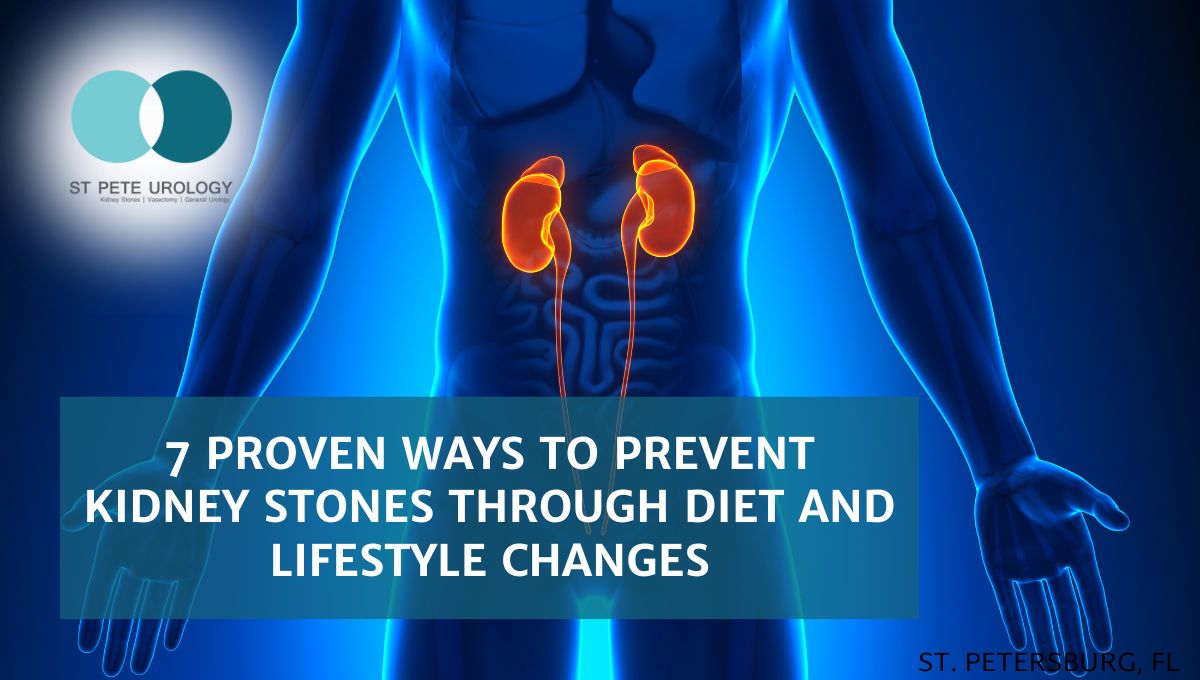3 Key Takeaways:
- Hydration prevents 50% of kidney stones—drink 2.5-3 liters daily, add lemon juice for citrate, and monitor urine color to stay properly hydrated.
- Adequate calcium (1,000-1,200 mg daily) reduces stone risk by 34%—contrary to popular belief, getting enough calcium from food sources binds oxalate in your gut and prevents it from forming kidney stones.
- Limiting sodium to 2,300 mg and animal protein to one serving daily cuts stone recurrence by 40-60%—excess sodium increases urinary calcium while high animal protein raises uric acid levels, both contributing to stone formation.
 Kidney stones affect 1 in 10 Americans, with recurrence rates reaching 50% within 10 years. St Pete Urology’s board-certified urologists treat hundreds of kidney stone patients each year in St. Petersburg, Florida, and consistently emphasize one truth: prevention beats treatment every time.
Kidney stones affect 1 in 10 Americans, with recurrence rates reaching 50% within 10 years. St Pete Urology’s board-certified urologists treat hundreds of kidney stone patients each year in St. Petersburg, Florida, and consistently emphasize one truth: prevention beats treatment every time.
The good news? Research from the National Kidney Foundation shows that dietary changes alone prevent up to 90% of recurring kidney stones. This guide breaks down the specific steps you can take today to protect your kidneys—no medical jargon, just evidence-based strategies that work.
Hydration: The Foundation of Kidney Stone Prevention
Drinking enough water stands as the single most effective way to prevent kidney stones. When you produce at least 2.5 liters of urine daily, your risk drops by 50% compared to those producing less than 2 liters.
Why it matters: Concentrated urine allows calcium oxalate and other minerals to crystallize. Dilute urine prevents these crystals from clumping together into stones.
Your baseline target is 8 to 12 cups (64-96 ounces) of fluid daily. If you work outdoors in Florida’s heat, exercise heavily, or sweat frequently, you need significantly more. Check your urine color—pale yellow indicates proper hydration, while dark yellow or amber signals you need more fluids.
Adding citrus makes water work harder for you. Lemons and limes contain citrate, which binds to calcium in your urine and blocks stone formation. A study published in the National Kidney Foundation journal found that adding just 4 ounces of lemon juice to your daily water intake increases urinary citrate levels enough to inhibit stone development. If you’ve experienced kidney stones before, this simple addition could prevent the next one.
Calcium Intake: Why More Can Mean Less Risk
Many patients arrive at St Pete Urology believing they should avoid calcium to prevent calcium oxalate stones—the most common type. This represents one of the most harmful misconceptions about kidney stone prevention.
Research in the American Journal of Clinical Nutrition demonstrates that low calcium intake actually increases stone risk by 34%. Here’s why: calcium in your digestive tract binds with oxalate from foods, preventing oxalate absorption into your bloodstream. Without sufficient dietary calcium, oxalate travels freely to your kidneys, where it crystallizes into stones.
Adults need 1,000-1,200 mg of calcium daily from food sources. Four 8-ounce glasses of milk provide this amount, but you can also get calcium from yogurt, cheese, fortified orange juice, sardines with bones, and almonds. Dr. Nicholas Laryngakis, one of St Pete Urology’s specialists in kidney stone treatment, recommends eating calcium-rich foods with meals rather than taking supplements between meals, as timing affects oxalate binding.
If you take calcium supplements, choose calcium citrate over calcium carbonate—citrate provides the added benefit of increasing urinary citrate while supplying calcium. Always take supplements with food to maximize oxalate binding in your gut.
Sodium and Protein: The Hidden Culprits
Federal guidelines recommend limiting sodium to 2,300 mg daily, yet the average American consumes over 3,400 mg. This excess matters more than you might expect for kidney stone prevention.
For every 2,300 mg of sodium you eat, your kidneys excrete an additional 40 mg of calcium into your urine. In stone formers, this calcium loss can be even higher. That calcium doesn’t just disappear—it becomes available to form stones. High sodium diets damage kidneys in multiple ways, increasing blood pressure and reducing the kidneys’ ability to filter waste effectively.
Cut sodium by reading labels on packaged foods, avoiding processed meats, limiting restaurant meals, and cooking at home with herbs and spices instead of salt. Small changes add up: replacing potato chips with unsalted nuts saves 300 mg of sodium per serving.
Animal protein presents a similar risk. Diets high in red meat, poultry, eggs, and seafood increase uric acid in your urine, which can lead to both uric acid stones and calcium stones. A portion of protein should be no larger than a deck of cards.
Consider the Mediterranean diet or DASH (Dietary Approaches to Stop Hypertension) eating plans—both reduce kidney stone risk by 40-60% according to research published by the National Institutes of Health. These plans emphasize plant proteins from beans, lentils, and tofu over animal proteins, while maintaining adequate nutrition.
Foods and Supplements That Support Kidney Health
Certain foods actively prevent kidney stones by increasing urinary citrate or providing kidney-protective compounds. Five daily servings of fruits and vegetables should form the foundation of your diet.
Stone-preventing foods include:
- Citrus fruits (oranges, grapefruits, lemons, limes)
- Berries (strawberries, blueberries—though limit if you have high oxalate)
- Melons (watermelon, cantaloupe, honeydew)
- Leafy greens except spinach (kale, arugula, lettuce)
- Whole grains (brown rice, quinoa, oats)
- Fish rich in omega-3s (salmon, sardines, mackerel)
A common concern involves oxalate-rich foods like spinach, beets, nuts, and tea. Rather than eliminating these nutritious options entirely, the National Kidney Foundation recommends eating them with calcium-containing foods, which binds the oxalate in your digestive tract. For example, have your spinach salad with a yogurt-based dressing, or eat nuts alongside cheese.
Regarding supplements:
Vitamin B6 may help reduce urinary oxalate in some patients. Fish oil supplements decrease both urinary citrate and oxalate levels. However, avoid high-dose vitamin C supplements (over 1,000 mg daily), as your body converts excess vitamin C to oxalate. Similarly, vitamin D supplements above recommended levels can increase calcium excretion.
Before starting any supplement regimen, consult with your urologist. A 24-hour urine test reveals your specific risk factors and guides personalized supplement recommendations. What helps one person might harm another depending on their urine chemistry. Research published in PMC’s medical journals confirms that individualized dietary therapy based on metabolic evaluation proves more effective than general dietary measures in preventing recurrent stone formation.
Take Control of Your Kidney Health Today
Preventing kidney stones requires consistent daily choices about what you drink and eat. Start with proper hydration—fill a large water bottle each morning and finish it by day’s end. Add adequate dietary calcium from food sources, not supplements. Reduce sodium and animal protein while increasing plant-based foods.
These changes don’t require perfection, just persistence. Each glass of water you drink, each serving of vegetables you eat, and each salty snack you skip reduces your risk of experiencing the excruciating pain of another kidney stone.
The board-certified urologists at St Pete Urology have helped thousands of Tampa Bay area patients prevent recurrent kidney stones through personalized dietary counseling and advanced treatment options when needed. If you’ve had one kidney stone, your risk of developing another within 10 years reaches 50%—unless you take action now.
Call St Pete Urology at (727) 478-1172 to schedule a consultation. Our specialists will perform a metabolic evaluation, analyze your specific risk factors through 24-hour urine testing, and create a personalized prevention plan tailored to your unique needs. Don’t wait for the next stone—prevent it today.
References:
- National Kidney Foundation. (2025, October 22). Six easy ways to prevent kidney stones. https://www.kidney.org/kidney-topics/six-easy-ways-to-prevent-kidney-stones
- National Institute of Diabetes and Digestive and Kidney Diseases. (2025, August). Eating, diet, & nutrition for kidney stones. https://www.niddk.nih.gov/health-information/urologic-diseases/kidney-stones/eating-diet-nutrition
- Lemann, J., & Asplin, J. R. (2014). Medical and dietary therapy for kidney stone prevention. BMC Nephrology, 15, Article 187. https://pmc.ncbi.nlm.nih.gov/articles/PMC4265710/
- Ferraro, P. M., & Gambaro, G. (2022). Diet and stone disease in 2022. American Journal of Kidney Diseases, 80(5), 682-689. https://pmc.ncbi.nlm.nih.gov/articles/PMC9410446/





